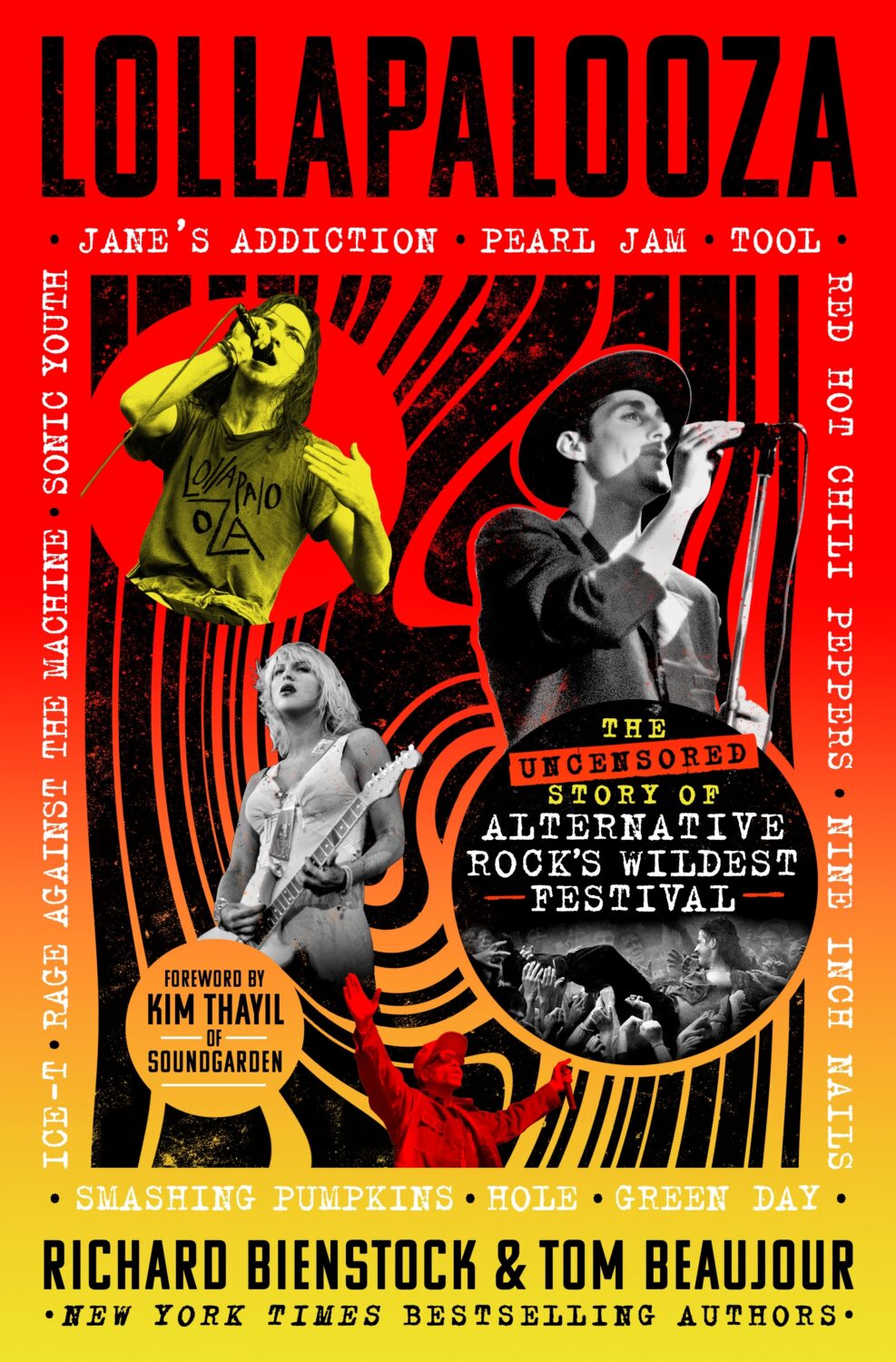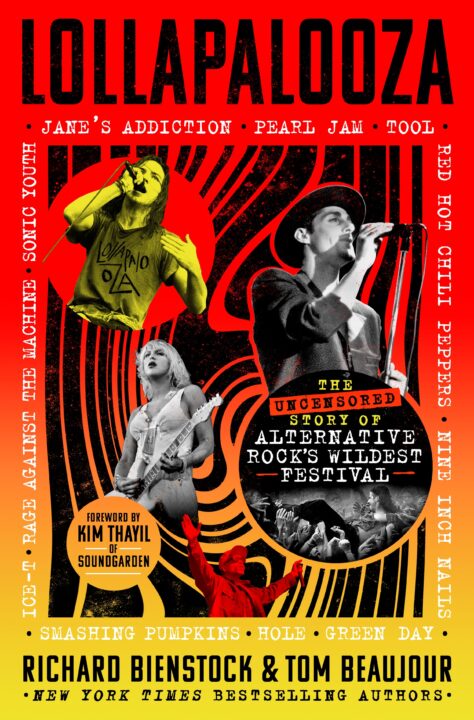“Perry Was A Fucking Asshole, Straight Up”: Read An Exclusive Excerpt From The New Lollapalooza Oral History Book

Authors Richard Bienstock and Tom Beaujour told the salacious story of ’80s hair metal in 2021’s acclaimed Nöthin’ But A Good Time: The Uncensored History Of The ’80s Hard Rock Explosion, which was recently adapted into a docuseries. Four years later, they’re back with another oral history offering a peek behind the scenes of Lollapalooza, the traveling festival that defined early ’90s alternative culture. Out next month, Lollapalooza: The Uncensored Story of Alternative Rock’s Wildest Festival features interviews with dozens of key players from Lolla’s heyday, all of whom offer candid takes on the backstage chaos, personal grievances, and industry politics that swirled around the era-defining road show.
The following exclusive excerpt includes perspectives on Lolla 1994 from more than a dozen people including Beastie Boys’ Mike D, Green Day’s Billie Joe Armstrong, Smashing Pumpkins’ Billy Corgan and Jimmy Chamberlin, Nick Cave and his Bad Seeds bandmate Mick Harvey, L7’s Donita Sparks and Jennifer Finch, the Breeders’ Kelley Deal, the Flaming Lips’ Wayne Coyne, and more. It starts with Armstrong calling Lolla co-creator Perry Farrell “a fucking asshole” and ends with journalist Jim DeRogatis calling Corgan “a dick.” Read on for more such combative delights.
//
STEVE KNOPPER (editor at large, Billboard magazine) The bill was stacked that year. So much so that the first band on, in the worst slot, was Green Day.
JOHN RUBELI (second-stage manager, Lollapalooza, 1993-1995) I can’t think of a single time that Perry pushed back or vetoed a band — except Green Day.
DON MULLER (agent; cofounder, Lollapalooza) Perry definitely dug his heels in on a lot of shit. But that’s kind of why Lolla was as good as it was.
BILLIE JOE ARMSTRONG (singer, guitarist, Green Day) Perry was a fucking asshole, straight up. He wasn’t a part of that conversation, because he’d checked out, but they asked us to play it and we said yes. And it was going to be the Boredoms on the first half, and us on the second half as the opening band. And then all of a sudden, he comes back in and he’s like, “I don’t want them on the bill.” Apparently, he thought that we were a band that was put together by Mo Ostin at Warner Bros.
JOHN RUBELI He was like, “They’re a boy band. I don’t want to book a boy band.” I was getting a lot of pressure from the label and management, like, “You gotta convince Perry.”
JO LENARDI (vice president of alternative marketing, Warner Bros. and Reprise Records) Green Day had two records out before they signed to Warner Bros. And they already had such a strong base; they were so huge in California already. So they weren’t considered a baby band by the label.
JOHN RUBELI To Perry’s credit, I was able to go through the band’s history in the Bay Area and how they had released indie records and eventually he said, “Okay, they can do half the tour, but I want the Boredoms on the other half.” They were almost the polar opposite, so they sort of canceled each other out.
BILLIE JOE ARMSTRONG For us it was really disappointing, because Perry was someone that we really respected. I think that made us want to play it even more, actually, because we wanted to prove that he had his head very far up his own ass.
DONITA SPARKS (singer, guitarist, L7) We got on the tour thanks to our perseverance, humor, and actually being a little bit confrontational. From what I understand, Nirvana wanted us on Lollapalooza, but then when Kurt died we lost that advocate, so we had to fight for it a little bit.
JENNIFER FINCH (bassist, singer, L7) I think that Nirvana had pulled out a few weeks before they said they did, because Kurt was hospitalized in Los Angeles and the whole thing got pretty shaky at that point. And we weren’t sure what was going on.
DONITA SPARKS We didn’t wanna be left out, you know? So we had to push. We kept asking our manager, “Hey, what’s going on? Are we on this tour or not?” And one time he said, “There’s a meeting about it going on right now.” We were like, “Really? Can you get a fax number for that meeting?” And he did. We sent a fax that said, “Who does L7 have to blow to serve Coors at Lollapalooza?” And we signed it: “Love L—always the bridesmaids, never the brides—7.” And then we were on the tour. I think that was a determining factor!
JENNIFER FINCH The Beastie Boys stepped up for us as well. We had done some extensive touring with them. Although secretly, I think that they wanted Luscious Jackson to be on the main stage. It had that feeling of, like, “Wow, can there really only be one?” At that time, there could only be one woman, there could only be one Black person. So it was just additionally frustrating.
KELLEY DEAL (guitarist, singer, the Breeders) There were so many more females in 1994 than the previous year or the year after. L7 and us and the Boredoms and D’arcy from Smashing Pumpkins. And then you had the whole side stage with Luscious Jackson. There was a bunch of females over there, too!
MICK HARVEY (guitarist, Nick Cave and the Bad Seeds) The whole background to us actually agreeing to do the tour was that our record company would keep asking whether we had plans to go to America. And basically, we were pretty exhausted with America by then and not really making much progress there. So we said, “Look, if we get a really good offer for a great opening spot on some big tour, or they offer us something like Lollapalooza, we’ll go, we’ll do it.” Of course thinking that we just wouldn’t be offered that. So, when they offered us Lollapalooza, we couldn’t say no. We were like, “Oh shit — now we have to do it!”
NICK CAVE (singer, Nick Cave and the Bad Seeds) We went into it not wanting to be there, and it just got worse.
JIMMY CHAMBERLIN (drummer, Smashing Pumpkins) There were times where Nick didn’t even show up and the band would just go on and play instrumental for forty-five minutes.
MICK HARVEY We always felt that we were a bit out of step with what was expected in America from bands. We felt that we weren’t there necessarily to entertain, and Americans — and I’m generalizing here—very often find that difficult to understand. It’s almost like “You are privileged enough to be able to get up there on the stage and then you don’t want to entertain us? What’s the matter with you?” But we weren’t very much in the business of being entertaining. In a way we just wanted to present the music and be as difficult as possible.
JIMMY CHAMBERLIN But it was still so compelling, because those guys are so talented. Nick Cave is a fully developed character, I would say. Really his own brand of his own brand. In a way it exposed the kind of neophyte-ness in us all to have somebody with that gravity on the tour. And being kind of a jazzer myself, it was really in my sweet spot, watching those guys articulate that stuff behind Nick. It was pretty magical every day.
GARY GRAFF (music writer, Detroit Free Press) Nineteen ninety-four definitely felt like a real return to form.
JOHN RUBELI I attribute a lot of that to Mike D, who sat in on most of the planning meetings leading up to it. He really tried not to let go of the indie reins.
MIKE D (MC, drummer, Beastie Boys) It’s all compromise. Our only concern was to get as far away from doing a “rock” festival as we could. We did that somewhat with the lineup.
JULIE PANEBIANCO (A&R representative, Capitol Records) I have to say that there was tension between the Pumpkins and the Beasties. I can’t think of a person who’s more diametrically opposite to Billy Corgan than fucking Adam Horovitz, Mike D, or Adam Yauch. They just didn’t mesh as people.
MIKE D I guess I thought, Okay, you put all these cool bands together, you put out your message, and all of a sudden you’re gonna change the face of what’s going on. But you’re not.
GREG KOT This is when the Beastie Boys transitioned into that series of albums where they were playing instruments again. They were sort of a hybrid band at that point. Maybe they couldn’t play that well per se, but they filled out their lineup with great musicians. And they delivered.
GARY GRAFF Smashing Pumpkins all were pissy on stage.
BILLY CORGAN (singer, guitarist, Smashing Pumpkins) So we’re headlining what became historically the biggest Lollapalooza ever. And there they are. There are the same football players that used to bully us in the hallways. I looked at it as, like, “No. You’re the enemy and we are here to take you on.” And to this day, I still have people walk up to me at airports going, “Man, I don’t know what that was about.” There are people to this day, and again I usually meet them at airports, who refuse to ever see the band or listen to the band after that show. You’re talking about forty-three shows, one was canceled due to rain. So forty-two times, I took the mic and went after that audience.
JIMMY CHAMBERLIN You know, just because he was the mouthpiece didn’t mean that the band as a whole wasn’t feeling those same emotions. We were pretty congruent when it came to the emotional status of the band. For the most part, those crowds really weren’t our crowd.
GARY GRAFF In Detroit they went off on Ted Nugent, which would seem like a dangerous thing to do in Detroit. They definitely were taking the piss out of him.
JULIE PANEBIANCO By the time the Pumpkins went on, everybody was, like, wilted from the heat.
JIMMY CHAMBERLIN Some of those shows were great. Some were okay. Some of ’em were a disaster. I don’t know. That’s usually the way it was back then.
STEVE “CHOPPER” BORGES (production manager, Lollapalooza 1993–97) They actually went over quite well. But Billy was just one of those people who believed his own press and thought he was a lot more than he really was.
WAYNE COYNE (singer, guitarist, Flaming Lips) Billy Corgan was such a raging asshole, especially back then, that you didn’t want to stick around and watch them. We liked a few of their songs, but we would just despise him after a while. So we’d leave right after the Beastie Boys played to avoid the traffic, because the audience was also starting to clear out.
GARY GRAFF My impression was that during Lollapalooza, at least the shows I saw, Billy was not unlike Eddie Vedder in ’92, coming to grips with this alternative rock stardom and what it meant. And there were enough shots being taken at him in the press that I’m sure he had his defenses up.
JIM DeROGATIS (pop music critic, Chicago Sun-Times) I never saw Corgan change. I thought he was a dick from day one.
Lollapalooza: The Uncensored Story of Alternative Rock’s Wildest Festival is out 3/25 via St. Martin’s Press.







